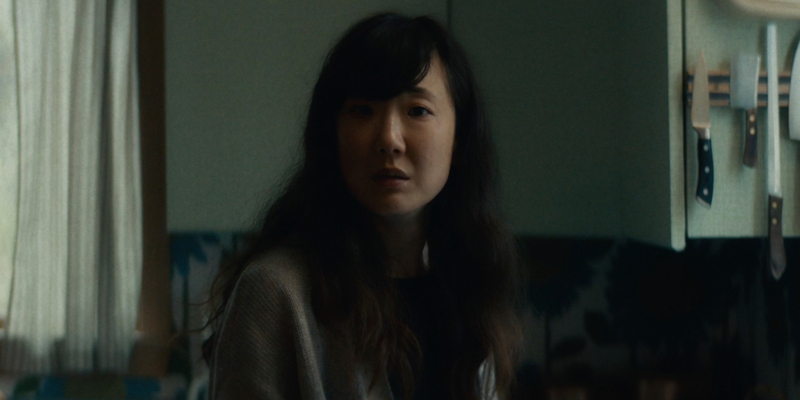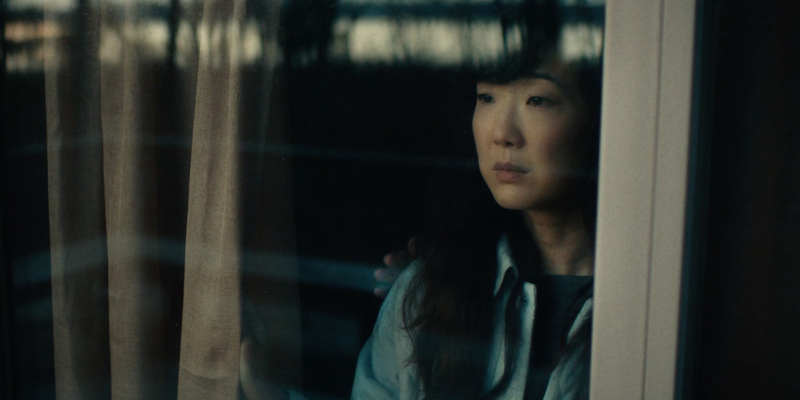
Review by
Eric Hillis
Directed by: Olivia Lloyd West
Starring: Jennifer Kim, Kentucker Audley, Marin Ireland

Having largely lain dormant for decades, "gaslighting" returned to the
lexicon a few years ago, though it's now more often than not wielded
incorrectly. The verb "gaslight" of course refers to Patrick Hamilton's
1938 play 'Gas Light', in which a husband attempts to drive his wife
insane, but look it up on a social media platform and you'll find most
people just use it when someone says something they disagree with (in
some quarters it's replaced "mansplaining"). With so much talk of
gaslighting in recent years, it's surprising that we haven't seen a
fresh wave of thrillers that employ Hamilton's format.
One movie that does fall squarely into the Gaslight sub-genre is
writer/director Olivia West Lloyd's Somewhere Quiet. Here we have a classic case of an emotionally fraught woman who may
or may not be in the process of being manipulated by her husband into
believing she's lost her mind. There's also a racial element added into
the mix, though this aspect often plays like an unexplored
afterthought.

Some time after surviving a traumatic abduction, Meg (Jennifer Kim) is brought by her old money husband Scott (Kentucker Audley)
to his family's beach house in Cape Cod. The idea is that she can
recover in the tranquil, off-season surrounds and avoid the media circus
that has followed her since surviving her ordeal.
If you've watched enough thrillers or horror movies, you know heading
off to an isolated house is always a recipe for disaster, so it's no
surprise that Scott's plan has quite the opposite effect on his troubled
wife. On the first night she accidentally breaks a plate, only to find
the shards have disappeared the following morning, with Scott claiming
it was a glass she broke rather than a plate. Scott also denies
sleepwalking during the night, and reminds Meg that her doctor warned
her she may at times be unable to distinguish dreams from reality.

Things take a turn for the worse when Scott's brash, wax-jacketed
cousin Madeline (Marin Ireland) calls over. Living with her
terminally ill mother close by, Madeline increasingly imposes herself on
Scott and Meg, showing no compassion for the latter's desire for
solitude. She also seems awfully touchy with Scott.
Ireland's performance is both the film's greatest strength and its
weakness. She plays the role like a snarling Disney villainess and is
always entertaining, but this doesn't really make a whole lot of sense
for her character. Madeline is clearly up to no good from the off,
purposely making passive aggressive gestures to Meg, often with a racial
element. "Is Meg short for something?" she asks. "Yes," replies Meg,
"for Megan." She speaks Korean to Meg, who doesn't have a word of the
language, having been adopted at the age of three. If Madeline wants to
cosy up to Meg and drive her nuts, why would she purposely get off on
the wrong foot in such a manner? Everything Madeline does only serves to
drive Meg away.

Meg is a confusingly written character. At some points the film leads
us to believe she's too intimidated by Scott to question certain
matters, but at other times she's happy to engage in blazing rows with
her husband. The racial element works well in the form of Madeline's
micro aggressions, but other aspects, like Scott and Madeline's family
history of Korean missionary work, are never really explored and come
off as a shoddy attempt to be timely. At times the film leans into
stereotypes of Asian timidity while attempting to subvert that very
notion. For a more convincing recent version of this, see Paris
Zarcilla's thriller
Raging Grace.
Kudos to Kim, whose performance leads us to overlook some of her
character's inconsistencies, at least while viewing. Lloyd's structuring
of the film means that we're too busy guessing what's at play to
interrogate some of the flaws in the script. I'm not sure why she chose
to withhold certain details from the viewer while pushing others
upfront, like the in media res opening which leaves us in little doubt
as to what sort of film we're watching. Some people love to treat a
movie like a puzzle and spend the running time second guessing the
filmmaker, but I've always preferred the Hitchcock school of laying the
cards on the table and giving the audience more information than the
protagonist possesses in order to generate suspense. There's not much in
the way of suspense here, and few shocks, but it's elevated above
Lifetime thriller of the week fare by its three central
performances.


